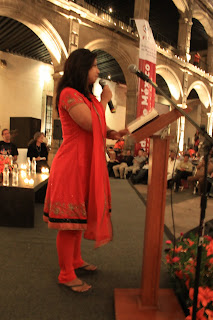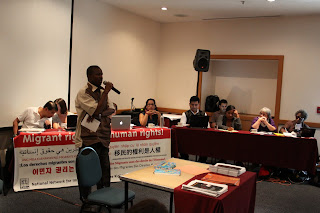November 13, 2010
[On the GFMD & International Migration]
From Frontera NorteSur (FNS): on-line, U.S.-Mexico border news
Internationally, migration stands out as one of the most heated issues of the times. Across the world, restrictionist measures increasingly shape public discourse. On November 10 and 11, representatives of 146 governments met in Puerto Vallarta, Mexico, where they discussed how public perceptions of migrants figure in the contemporary global political landscape.
A consensus on combating the demonization of migrants was evident at the the Fourth Global Forum on Migration and Development (GFMD), but differences emerged on how best to counter anti-immigrant sentiments and whether governments-especially those from the developed world-are doing enough to curb outbreaks of xenophobia and support immigrants.
At one session, United Nations High Commissioner for Human Rights Navanathem Pillay stressed that governments are obligated to apply international legal instruments dedicated to the rights of migrants. Pillay urged more countries must ratify the Migrant Workers Convention. “It’s shameful that only about 40 states have ratified this convention, which has been around for about 40 years,” she said.
The host country of the 2010 GFMD, Mexico is among nations which has signed and ratified the Migrant Workers Convention.
Based in Switzerland, an international network of civil society organizations is promoting the ratification and monitoring of the agreement, which mandates that signatories accord rights to immigrant workers that are increasingly the source of heated political disagreement in developed nations. The members of the network include Anti-Slavery International, Human Rights Watch, the World Council of Churches and many other labor and human rights advocates across the world.
Fresh from a speech delivered to the Council on Foreign Relations in which he highlighted the “critical role” of immigration in US history, State Department official Eric P. Schwartz led the US delegation in Puerto Vallarta.
In a presentation to the GFMD, Schwartz, an assistant secretary for refugee and migration affairs, spoke about the Obama administration’s efforts to assist local and state governments in refugee resettlement and the integration of newcomers in host communities.
Although perceptions of migrants are shaped by interactions at the local level, it is incumbent on Washington to help ease the transition of migrants and their integration into society, Schwartz said. To do otherwise, he said, represents a federal let-down of local communities.
Government has a role to play in shaping public attitudes about immigration, Schwartz told a packed room, specifically through a leadership that channels concerns and fears, opposes the demonization of immigrants and emphasizes the costs to society of keeping migrants as an “underground population.”
Despite the prevalance of a “difficult conversation” on immigration in the US at the moment, Schwartz said demographic changes were among reasons he was optimistic about the long-term future of immigrants in a nation built up by immigrants. In the not-too-distant future, no single racial or ethnic group will constitute a majority in the US, he added.
A representative of the socialist government of Bolivian President Evo Morales questioned the immigration policies of the US and other developed nations. Eliciting a round of applause from an audience stacked with officials from different governments, Alfonso Ramiro Hinojosa, general director of consular affairs for Bolivia’s Ministry of Foreign Affairs, slammed measures like Arizona’s SB 1070 law for inflamming public opinion against migrants.
Schwartz countered that the Obama administration opposes SB 1070 and backs comprehensive immigration reform as an answer to the growing attempt by states to assume federal authority. In comments to Frontera NorteSur, Schwartz reiterated that President Obama is against several parts of SB 1070, and both the US president and Secretary of State Hillary Clinton have taken time to “articulate their set of concerns” about the law, as well as speak out on the general importance of immigration to “our well-being.”
Internationally, SB 1070 continues being a contentious matter. In Puerto Vallarta, flyers were passed out at the GFMD urging readers to contact Major League Baseball Commissioner Bud Selig and demand that the 2011 All-Star Game be moved out of Phoenix.
Washington’s response to SB 1070 is still “insufficient,” Bolivian official Hinojosa told Frontera NorteSur. “This law continues generating dramas among migrants in our countries,” Hinojosa said. Bolivia’s posture, he said, is shared by the rest of South America.
In late October, Bolivia hosted the most recent meeting of the South Amercan Conference on Migration, a grouping which brings together 12 nations. The regional sentiment, Hinojosa added, is to uphold a “dignified immigration” that respects human beings who are usually subordinated to the interests of capital.
Founded in 1999, the South American Conference on Migration promotes a gradual but decisive drive towards a “regional integration based on the construction of the free mobility of persons and South American citizenship,” according to an organizational document.
Hinojosa estimated that about 250,000 Bolivians currently reside in the US. In the bigger scheme of things, Bolivia is among countries in the world that could be most impacted by climate change and forced migration – issues which were considered in this year’s GFMD.
According to Hinojosa, President Morales’ government considers a climate agreement at the upcoming Cancun summit a “top priority,” but will not be too disappointed if no accord materializes from next month’s world meeting. The massive turn-out of 30,000 at the Cochabamba climate conference hosted by Bolivia last spring is an example of the inexorable tide in favor of climate action, Hinojosa insisted.
“We’re accumulating forces,” the Bolivian diplomatic official said. “If not Cancun, something soon.”
On immigration, Hinojosa said “double-talk” characterized the stances and policies of developed countries. Besides SB 1070 in the US, he exorciated Italy’s denial of health care to migrants, France’s deportation of Romas and the failure of developed nations to ratify the Migrant Workers Convention.
Hinojosa said he was dismayed that he had not heard a single Mexican official address the massacre of 72 Central American and South American migrants in the northern Mexican border state of Tamaulipas last August. “Not talking about it, doesn’t make it go away,” he maintained.
Not surprisingly, debate at the GFMD examined the role of media in shaping public perceptions of migrants. A representative of Lebanon reported how radio spots promote a positive image of immigrants, whose exodus after war broke out with Israel in 2006 caused a crisis for a small country suddenly short of foreign workers.
An official from the Phillipines described how his government employs the popular soap opera format on television to give migrants a high-profile in the public sphere. Armed with access to all the latest statistics on immigration and its economic impacts, the GFMD should do more in the public relations field for migrants, some speakers concurred.
Several members of non-governmental organizations were allowed to address government meetings of the GFMD. While pledging to continue her work against racism and xenophobia, Carol Barton of the United Methodist Church in the US said economic changes were needed to counter public insecurities that stem from the economic crisis and fan anti-immigrant attitudes.
“Just giving facts and figures doesn’t change the reality of those fears,” Barton said. Concrete action was necessary on home foreclosures, mass unemployment and other problems arising from the Great Recession, she said. Getting to the structural roots of economic problems, the church activist contended, was paramount “if we are going to end this kind of backlash that’s directed against migrants.”
The next GFMD is scheduled for Switzerland in 2011.
-Kent Paterson
Frontera NorteSur (FNS): on-line, U.S.-Mexico border news
Center for Latin American and Border Studies
New Mexico State University Las Cruces, New Mexico
For a free electronic subscription email: fnsnews@nmsu.edu
Labels: AGP, GFMD, human rights, immigration, Migrant Workers Convention, NNIRR, PGA, United Methodist Church, Vallarta








